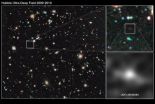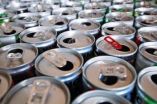(Press-News.org) Phosphate-free automatic dishwashing detergents — introduced to combat the phosphate-fed algae blooms that foul the nation's lakes and rivers — may be making the fish happy. But they're putting a frown on the faces of some consumers who say the new products leave dishes dirty. That's the topic of the cover story in the current edition of Chemical & Engineering News (C&EN), ACS' weekly newsmagazine.
C&EN Assistant Managing Editor Michael McCoy described how new laws in 16 states require manufacturers to eliminate phosphates from automatic dishwasher detergents sold in the United States. Once hailed as a wonder for making dishes squeaky clean, sodium tripolyphosphate later became a villain in the fight against water pollution. It can wash down household drains, through sewage treatment facilities, and into lakes and streams. Just like the phosphate fertilizer applied to crops, it kick-starts growth of algae, which die, decay, and deplete oxygen from the water, causing fish kills and other problems. McCoy explains that the well-intentioned phosphate-removal laws, however, have caused an unintended problem for some consumers, leaving dishes and glassware with spots and unsightly films.
Detergent manufacturers are now turning to chemists and the chemical industry in a search for phosphate-free formulas that don't leave dishes dirty. Some manufacturers have already found promising alternatives, while others are testing new detergent ingredients, including polymers and enzymes, that can clean like phosphates without contributing to water pollution.
INFORMATION:
ARTICLE FOR IMMEDIATE RELEASE
"Goodbye, Phosphates"
This story is available at
http://pubs.acs.org/cen/coverstory/89/8904cover.html
Fish smile but some consumers frown at new genre of phosphate-free detergents
2011-01-27
ELSE PRESS RELEASES FROM THIS DATE:
Hubble finds a new contender for galaxy distance record
2011-01-27
Astronomers have pushed the NASA/ESA Hubble Space Telescope to its limits by finding what is plausibly the most distant and ancient object in the Universe [1] ever seen. Its light has travelled for 13.2 billion years to reach Hubble [2], which corresponds to a redshift around 10. The age of the Universe is 13.7 billion years.
The dim object, called UDFj-39546284, is likely to be a compact galaxy of blue stars that existed 480 million years after the Big Bang, only four percent of the Universe's current age. It is tiny. Over one hundred such mini-galaxies would be needed ...
Shockable cardiac arrests are more common in public than home
2011-01-27
Cardiac arrests that can be treated by electric stimulation, also known as shockable arrests, were found at a higher frequency in public settings than in the home, according to a National Institutes of Health-funded study appearing in the Jan. 27 issue of the New England Journal of Medicine.
The study compared home and public cardiac arrests under various scenarios. For example, the study considered whether bystanders or emergency medical services (EMS) personnel witnessed the cardiac arrest, and whether the person experiencing the arrest received treatment with an automatic ...
Hubble sees farther back in time than ever before
2011-01-27
Pasadena, CA— Astronomers have pushed NASA's Hubble Space Telescope to it limits by finding what they believe to be the most distant object ever seen in the universe—at a distance of 13.2 billion light years, some 3% of the age of universe. This places the object roughly 150 million light years more distant than the previous record holder. The observations provide the best insights yet into the birth of the first stars and galaxies and the evolution of the universe. The research is published in the 27th January edition of Nature.
The dim object is a compact galaxy made ...
NASA's Aqua Satellite sees Tropical Depression Anthony heading toward Australia
2011-01-27
NASA's Aqua Satellite captured a visible image of the former Tropical Storm Anthony, now weakened to a tropical depression, but forecasters aren't counting Anthony out yet. Despite its weakened condition Anthony continues to move west toward Queensland, Australia and into a more favorable area for sustaining a tropical cyclone.
The Atmospheric Infrared Sounder (AIRS) instrument that flies aboard NASA's Aqua satellite captured a visible image on Jan. 26 at 03:23 UTC of Tropical Depression Anthony in the South Pacific Ocean. The image revealed a cloud-filled center of the ...
NASA's TRMM Satellite sees TD10S strengthen into Tropical Storm Bianca
2011-01-27
The life of a cyclone is a complex one, and NASA satellites have kept track of a low that has now become Tropical Storm Bianca just off the northern coast of Western Australia.
What began as a low pressure system designated as System 98S on January 24, brought rains near Kuri Bay, Australia. On January 25, System 98S strengthened into the tenth tropical depression of the Southern Pacific Ocean hurricane season and was designated as "10S." Today, January 26, that low intensified into a tropical storm and was named Bianca.
NASA's Tropical Rainfall Measuring Mission (TRMM) ...
Gender and hygiene: Could cleanliness be hurting girls?
2011-01-27
CORVALLIS, Ore. – Little girls growing up in western society are expected to be neat and tidy – "all ribbon and curls" – and one researcher who studies science and gender differences thinks that emphasis may contribute to higher rates of certain diseases in adult women.
The link between increased hygiene and sanitation and higher rates of asthma, allergies and autoimmune disorders is known as the "hygiene hypothesis" and the link is well-documented. Yet the role of gender is rarely explored as part of this phenomenon.
Oregon State University philosopher Sharyn Clough ...
Food-borne bacteria causes potentially fatal heart infection
2011-01-27
Researchers at the University of Illinois at Chicago College of Medicine have found that particular strains of a food-borne bacteria are able to invade the heart, leading to serious and difficult-to-treat heart infections.
The study is available online in the Journal of Medical Microbiology.
The bacteria Listeria monocytogenes is commonly found in soft cheeses and chilled ready-to-eat products. For healthy individuals, listeria infections are usually mild, but for susceptible individuals and the elderly, infection can result in serious illness, usually associated with ...
President Obama calls for increased investment in science, including biomedical research
2011-01-27
Bethesda, MD - Last night, in his State of the Union address, President Barack Obama presented the nation with a vision of a better future through investment in education, infrastructure, and research. Recognizing the role that innovation has played in this nation's history and the promise that it holds for addressing the many challenges we face, he stated that "maintaining our leadership in research and technology is crucial to America's success."
William T. Talman, MD, President of the Federation of American Societies for Experimental Biology (FASEB) responded, "we ...
ONR, Marine Corps show alternative energy use at forward operating bases can save dollars, lives
2011-01-27
ARLINGTON, Va.--To cut down on convoys trucking fuel to forward operating bases, as well as implement the Department of the Navy's vision for energy efficiency, the Office of Naval Research (ONR) and elements within the Marine Corps have successfully demonstrated their goal to reduce petroleum and energy usage in remote locations in Afghanistan.
"The early results from the front indicate the ability of ONR and its Marine Corps partners to make a difference in survivability and efficiency for our warfighters," said Rear Adm. Nevin Carr, chief of naval research.
"We ...
Non-alcoholic energy drinks may pose 'high' health risks
2011-01-27
COLLEGE PARK, Md. – Highly-caffeinated energy drinks – even those containing no alcohol – may pose a significant threat to individuals and public health, say researchers at the University of Maryland School of Public Health and Wake Forest University School of Medicine.
In a new online commentary in the Journal of the American Medical Association (JAMA), they recommend immediate consumer action, education by health providers, voluntary disclosures by manufacturers and new federal labeling requirements.
"Recent action to make pre-mixed alcoholic energy drinks unavailable ...





